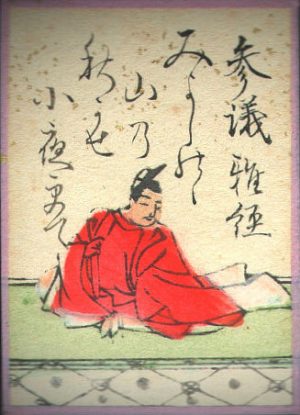First Friend: Fujiwara no Masatsune, "Hyakunin Isshu 94"
The first friend we’re making in the Hundred Friends project is Fujiwara no Masatsune, a Japanese poet and editor who lived 1170-1221. His picture and this poem is on the card to the right, and you can read a little more about both over here, if you like.
As I mentioned in the introductory post, this will mostly be an English project, but since the idea came from the Japanese anthology Hyakunin Isshu, I thought it would be appropriate to begin with a poem from that collection. This is the ninety-fourth poem in that book, and in Mostow’s translation goes like this:
